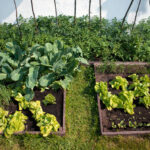Composting is Key to Sustainable Urban Agriculture
February 16, 2024

My partner recently sent me this article, Urban agriculture’s carbon footprint can be worse than that of large farms, and I felt a sense of outrage and surprise. I love urban agriculture!
I was relieved to dig a little deeper into the publication to find that the study did find that urban agriculture has a smaller carbon footprint than conventional agriculture when the following practices are followed:
– Using construction debris and demolition waste for infrastructure
– Longer-term use of infrastructure and tenancy of a space
The Compost Education Centre helps to steward several urban gardens including at our demonstration site, a boulevard garden network in the Fairfield-Gonzales neighborhood, the Alexander Park Orchard, and SJ Burnside Secondary School’s teaching garden. Our demonstration site features eight different composting systems, rainwater cisterns and barrels, and a solar-powered aquaponics system. Come by anytime for a visit!
We have found that urban gardens serve as powerful outdoor classrooms that inspire local climate mitigation and adaptation activities. For example, our urban gardens empower community members to:
– Produce food locally with the objective of improving food security and mitigate emissions associated with our food system.
– Cultivate native plant and pollinator gardens to support pollinators, which are under threat from climate change.
– Implement rainwater harvesting to reduce climate change vulnerability.
In addition to acquiring technical skills, our community members experience increased connectivity to a peaceful and welcoming space in Victoria. We consider our urban gardens to be a nature-based driver for social cohesion and improved climate change adaptation – and we’re excited that the research backs us up, too.
Claire Remington, Executive Director
Posted in Uncategorized